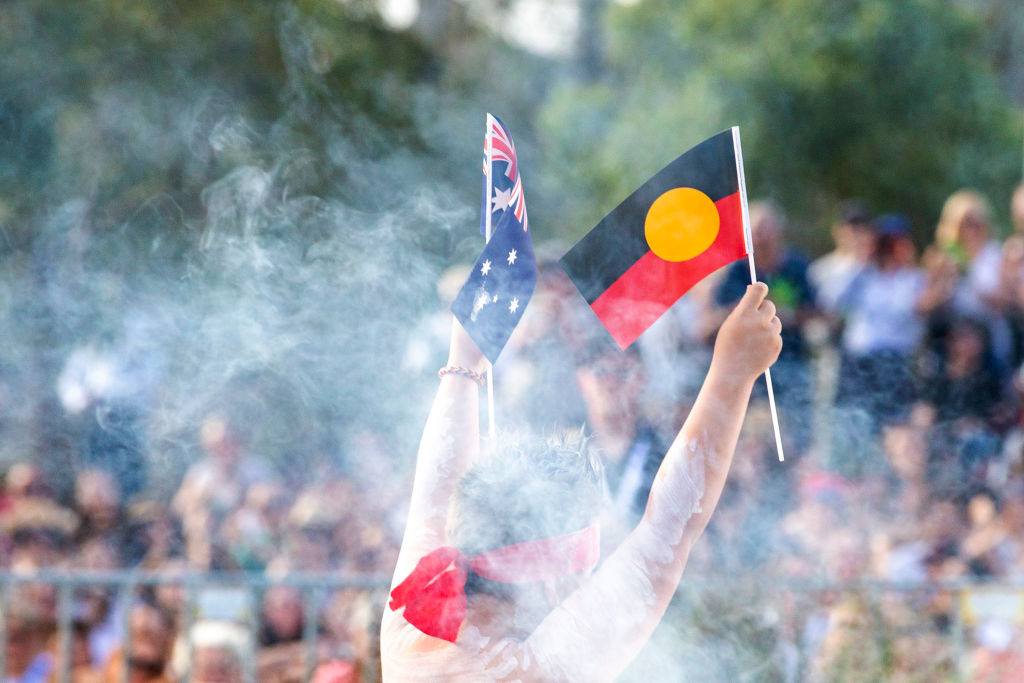Australia’s national day, which falls today, has two purposes. It is an opportunity for Australians to celebrate who they are and how fortunate we are to live in a stable democracy, thousands of miles from terror, strife and conflict. But it also marks the end of Australia’s languid summer when it’s time to get back to work and for children to start a new school year. It’s a timely excuse to have a long weekend, blessed by late summer sunshine.
Unfortunately, however, Australia Day has become an ideological plaything of Australia’s professional grievance industry. Left and Aboriginal activists rebadge it as Invasion Day, protesting the arrival of Britain’s First Fleet on 26 January 1788 as the beginning of more than 200 years of colonisation and dispossession for Aboriginal Australians.
In opposing the national day, activists have even started their own Australia Day traditions. On Friday, Randwick in Sydney’s affluent eastern suburbs was the scene of the annual vandalism of a statue of Captain James Cook, who didn’t colonise Australia, but whose expedition led to the government of the younger William Pitt choosing Botany Bay as the site of a British penal colony. This year, the Cook statue literally was defaced, with its face damaged and hands cut off, as well as the obligatory red paint splashed liberally over both statue and plinth.
Local councils with left-wing majorities have been enthusiastically promoting Invasion Day vibes for years, with some even refusing to hold citizenship ceremonies on Australia’s national day. This year, the Sydney City Council, headed by a left-wing lord mayor, Clover Moore, is funding something called the Yabun Festival, billed as ‘Australia’s biggest festival of Aboriginal and Torres Strait Islander culture’, and declaring that ‘it’s important on Invasion Day that we create a space for everyone to gather, honour and celebrate the survival of the world’s oldest living culture and build understanding of resistance and mourning. Always was. Always will be, Aboriginal land’.
Having also supported the failed Aboriginal voice to parliament referendum in 2023, a significant number of large businesses deny the legitimacy of Australia Day. Beside pious statements they, like many government agencies, give employees the opportunity to work on 26 January and take another day in lieu, and refuse to mark the day in their marketing.
The corporate cake this year is taken by the Australian Venue Company, which owns and operates over 200 pubs and entertainment venues around Australia. ‘Australia Day is a day that causes sadness for some members of our community, so we have decided not to specifically celebrate a day that causes hurt for some of our patrons and our team,’ a company spokesman told a Melbourne newspaper.
That’s fine, but despite its Australian-sounding name the Australian Venue Company is owned by foreign private equity firm PAG, which is based in Hong Kong (but also has London and New York offices).
There are signs that decades of sustained attacks on Australia Day are wearing thin with Australians
A major public holiday in the former British colony is 1 July, the Hong Kong Special Administrative Region Establishment Day celebrating Britain’s 1997 handover. Given the slow death of liberty and democracy in Hong King since then, with opponents of the Beijing regime being harassed, intimidated and imprisoned, sure that’s a day that would ‘cause sadness for some members of our community’? And it seems it’s a safe bet that an announcement from PAG that it would allow its staff to work on the day itself, as a form or personal process, would bring Chinese police and security services down on them like a ton of bricks.
Yet there are signs that decades of sustained attacks on Australia Day are wearing thin with Australians. Noisy and angry protest rallies in state capital cities may get plenty of media attention, but don’t reflect the public mood.
Instead of continuing to decline, popular support for Australia Day is actually increasing. A slew of opinion polls are showing strong majority support leaving the national day alone. This week, polling for Australia’s two leading left-leaning newspapers, the Sydney Morning Herald and the Melbourne Age, found that support for 26 January leapt from 47 to 61 per cent for in just two years.
Suddenly it is again acceptable, if still unfashionable among activists and the chattering classes, for Australians to find their true voice, celebrating the best of our country but acknowledging stains and blemishes we still need to overcome, not least Aboriginal social and economic disadvantage and now, sadly, the scourge of anti-Semitism.
So popular Australia Day is again becoming, even politicians of Australia’s Labor party declare themselves in favour. One state Labor premier, South Australia’s Peter Malinauskas, could not have expressed the justification of Australia Day better.
‘I’m proud to be Australian’, Malinauskas said. ‘I know the country has challenges and points of difference. But it’s also important to have a sense of pride in how lucky we are to be here. I hope we all share the view that we live in the greatest country in the world: it’s peaceful, we don’t suffer divisions we see in other parts of the world. I just hope that as many people as possible to take the opportunity to reflect on that’.
As religious and ethnic bigotry, the polarising of our politics and the coarsening of civil discourse threaten to get out of hand in Australia, we cannot simply gather around an Australia Day barbecue and complacently take what we have for granted.







Comments